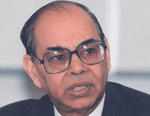Mahbub ul Haq
 Mahbub ul-Haq (}}; ) was a Pakistani economist, international development theorist, and politician who served as the minister of Finance from 10 April 1985 to 28 January 1986, and again from June to December 1988 as a caretaker. Regarded as one of the greatest economists of his time, Haq devised the Human Development Index, widely used to gauge the development of nations.
Mahbub ul-Haq (}}; ) was a Pakistani economist, international development theorist, and politician who served as the minister of Finance from 10 April 1985 to 28 January 1986, and again from June to December 1988 as a caretaker. Regarded as one of the greatest economists of his time, Haq devised the Human Development Index, widely used to gauge the development of nations.After graduating with a degree in economics from the Government College University in Lahore, he won a scholarship to the University of Cambridge in England, where he obtained a second higher degree in the same field. He later received his PhD from Yale University in the United States and conducted postdoctoral research at the Harvard Kennedy School. Haq returned to Pakistan to serve as the chief economist of the Planning Commission throughout the 1960s. In 1970, after the fall of Ayub Khan, Haq moved to Washington, D.C. to serve at the World Bank as Director of Policy Planning until 1982, where he played a major role in reorienting its approach to assisting development in low-income countries.
He returned to Pakistan in 1982, and in 1985 assumed the position of Finance Minister with the Government of Pakistan, and oversaw a period of economic liberalization in the country. In 1989, he moved back to the United States, where he served as the special adviser to the United Nations Development Programme (UNDP) under its head, William Henry Draper III. At the UNDP, Haq led the establishment of the Human Development Report and the widely-respected Human Development Index (HDI), which measures development by well-being, rather than by financial income alone. He returned to Pakistan in 1996 to establish the Human Development Centre in the capital city of Islamabad.
Haq is considered to have had a profound effect on global development. His 1995 book, ''Reflections on Human Development'', is said to have opened new avenues to policy proposals for human development paradigms, such as the United Nations Global Compact that was formed in 2000. Amartya Sen and Tam Dalyell judged Haq's work to have "brought about a major change in the understanding and statistical accounting of the process of development". ''The Economist'' called him "one of the visionaries of international development". He was widely regarded as "the most articulate and persuasive spokesman for the developing world". Provided by Wikipedia